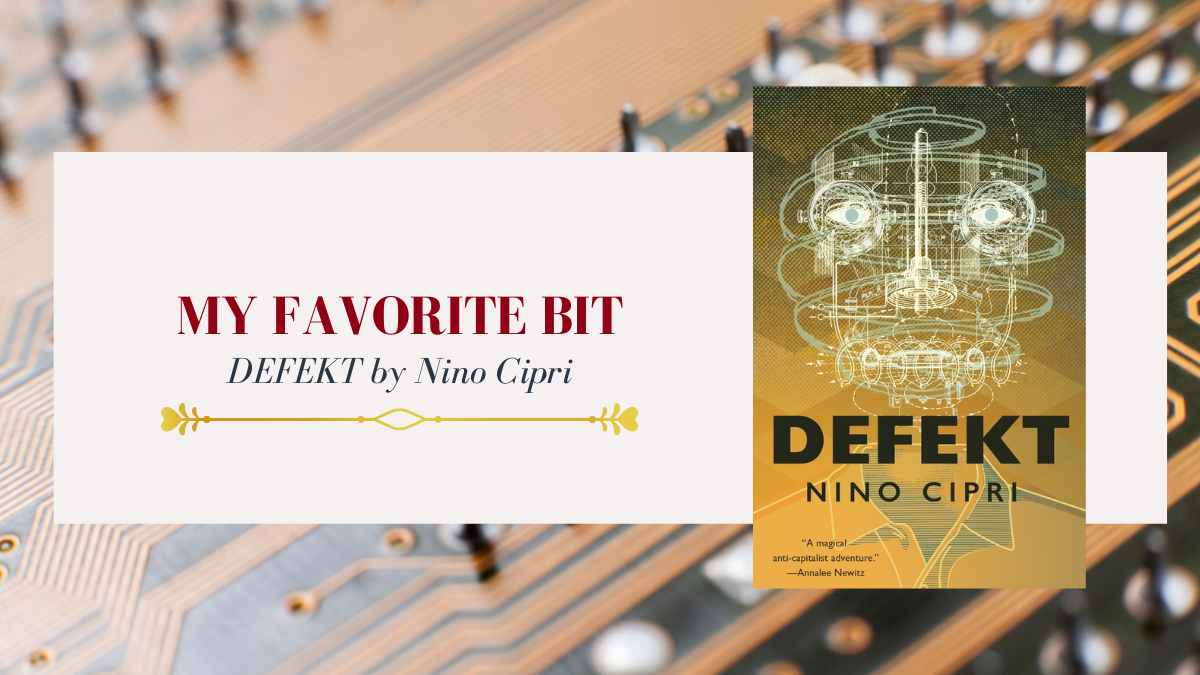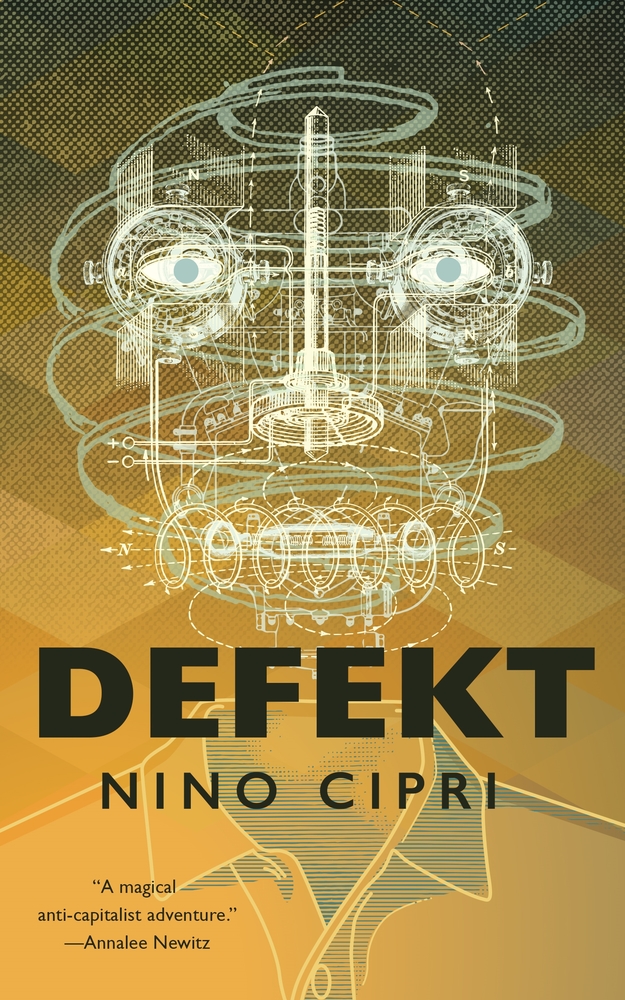
Nino Cipri is joining us today to talk about their novella, DEFEKT. Here’s the publisher’s description:
Find out if five Dereks are better than one in Nino Cipri’s Defekt, the sequel to Finna, the surrealist world-hopping adventure.
Derek is LitenVärld’s most loyal employee. He lives and breathes the job, from the moment he wakes up in a converted shipping container at the edge of the parking lot to the second he clocks out of work 18 hours later. But after taking his first ever sick day, his manager calls that loyalty into question. An excellent employee like Derek, an employee made to work at LitenVärld, shouldn’t need time off.
To test his commitment to the job, Derek is assigned to a special inventory shift, hunting through the store to find defective products. Toy chests with pincers and eye stalks, ambulatory sleeper sofas, killer mutant toilets, that kind of thing. Helping him is the inventory team — four strangers who look and sound almost exactly like him. Are five Dereks better than one?
What’s Nino’s favorite bit?

NINO CIPRI
Stories aren’t hermetically sealed against the realities in which they’re written; DEFEKT, which I worked on consistently from March to August of 2020, almost inevitably became a pandemic story. I decided early on to excise any mentions of infection or outbreaks, but the loneliness, uncertainty, claustrophobia, and fear bled through to this story, melding with the abiding anger I have about workers’ rights in a country that continually tries to erode them. DEFEKT is a rageful shriek at the pandemic’s many interconnected tragedies, with a light sprinkling of absurdism and dancing toilets, because no hellscape is without humor.
FINNA and its sequel DEFEKT take place at a large, Scandinavian homegoods store called LitenVärld. It’s not IKEA, but like IKEA, it is a liminal place where space and time get kinda weird. It’s a tough market, and LitenVärld has had to make tough decisions to stay afloat. In FINNA, this meant sending untrained workers through wormholes to track down wayward customers (covered under that “other duties as required” line in their employment paperwork). With DEFEKT, it’s volunteering a worker for an inventory shift to eliminate an outbreak of suddenly animated furniture, alongside an entire team of their clones.
With both stories, I wanted to write about a worker’s slow awakening to the exploitative system they’re trapped in. FINNA focuses on escaping it; DEFEKT seeks to change it. Instead of a protagonist already simmering with dissatisfaction, Derek is a loyal part of the LitenVärld family. He’s been Sales Associate of the Month and his 4.76 rating on customer satisfaction surveys. He is the perfect employee; he was made for this work.
Right up until he needs to take a sick day.
That was the first intrusion of the pandemic into my story. Not the idea of sickness itself, but the way that US policies and cultures of work deal with sickness. Leaving aside workers like Derek, who are reluctant to take sick days out of pride or not wanting to let their employers down, many workers can’t afford an unpaid sick day, or can be punished for taking them. 81 workers at a single Walmart in Massachusetts tested positive for Covid-19 in a one day; 700 workers at one Texas meat processing plant were infected.
(Sidenote: Cook County, Illinois, where DEFEKT takes place, has mandated that employers offer paid sick leave for most workers. You can find out if your state or municipality has similar ordinances here.)
My favorite scene in the book comes relatively early. Because this is (very handwavey) sci-fi, Derek does not contract a normal illness or infection. Derek’s “symptoms” seem to center on his voice; the things he’s forced to say, and the things he’s forced to hold back.
The day after he calls out sick, Derek is standing at his mirror, practicing the various intonations for a friendly “How can I help you today?” (As one does when one is a very normal employee at a normal job.)
And then he loses control of his voice–and his self that’s in the mirror.
Derek looked at his reflection. His throat felt tight, like whatever was inside him had circled around his neck and was strangling him.
“Repeat after me,” his reflection said. It looked infinitely calmer than he felt.
“How can I help you today? How can I help you today? If you sign up for the LitenVärld VIP membership, you’ll save twenty percent on this purchase and ten percent on all future purchases. Did you know that all purchases over a hundred and fifty dollars include free shipping? Do you want to sign up for our newsletter? Do you want to sign up for our newsletter? Sign up for our newsletter? If you spend fifty dollars today, we’ll include a coupon for a free jar of lingonberry jam. A human touch. A human touch in your time of need—”
The cut on his throat yawned open beneath his fingers and gave a whistling shriek.
After finishing that scene, I remember sitting back and thinking, Did I just accidentally make this a horror story?
It’s not horror; it has humor and a little bit of romance (beware if maybe self-cest is not your thing) and the aforementioned dancing luxury toilet that plays Debussy anytime you get near it. Mostly, it has feelings: joy and recognition and betrayal and fear and, like I said, a simmering anger that throbs through it. I didn’t write DEFEKT as an allegory for workers’ rights (though if I had, I would stand in excellent company in SF/F), but it’s informed by five years of labor organizing, and more than twenty years of being a low-wage worker. It’s informed by a year spent in quarantine, seeing the trolley problem play out to its most callous conclusions.
DEFEKT’s dedication is “to everyone who’s struggled to find their voice and speak out.” Part of that struggle is just naming things as they are: that some jobs are exploitative and some bosses abusive, that I/you/we deserve better, and that if we fight for each other, we might actually win.
LINKS:
BIO:
Nino Cipri is a queer and trans/nonbinary writer, editor, and educator. Their writing has been nominated for the Shirley Jackson, World Fantasy, Nebula, Lambda, and Hugo awards. A multidisciplinary artist, Nino has also written plays, screenplays, and radio features; performed as a dancer, actor, and puppeteer; and worked as a stagehand, bookseller, bike mechanic, and labor organizer.
One time, an angry person on the internet called Nino a verbal terrorist, which was pretty funny.
Nino’s 2019 story collection Homesick won the Dzanc Short Fiction Collection Prize, and was chosen as one of the top ten books on the ALA’s Over the Rainbow Reading List. Their novella Finna — about queer heartbreak, working retail, and wormholes — was published by Tor.com in 2020, and its sequel Defekt will be out in April 2021. Nino’s YA horror debut, Burned and Buried, will be published by Holt Young Readers in 2022.
